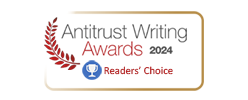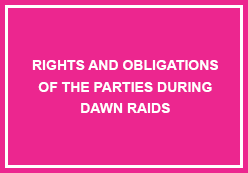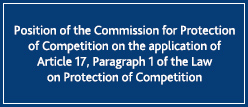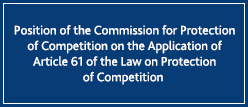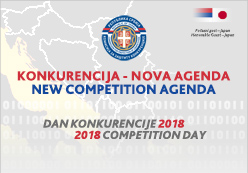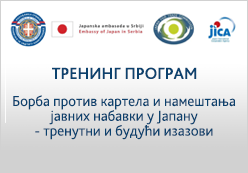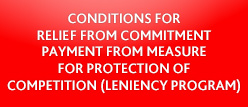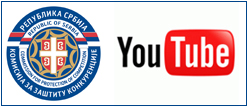Domestic Cooperation in 2017
Agreements with regulators and state authorities and their respective implementation
The Commission perceives a qualitative information exchange system built between all relevant authorities, organizations and bodies founded by the Republic of Serbia as an important precondition for achieving increased efficiency in its work. To that end, a permanent exchange of information and data, harmonization of positions on issues of mutual interest, as well as joint participation in activities contributing to the promotion of policies implemented by related authorities, and whose work can be beneficial for the development of market competition, represent one of the key elements in day-to-day work.
The Commission’s cooperation with institutions as signatories to protocols on cooperation in the previous years, proved as extremely beneficial foremost in terms of data exchange, but also in the context of exchange of positions on all current topics or proceedings conducted before the Commission or other authorities and institutions.
In the course of previous years, the Commission signed cooperation agreements with the National Bank of Serbia, Ministry of Interior, Energy Agency, Regulatory Agency for Electronic Communications and Postal Services – RATEL, Business Registers Agency, Chamber of Commerce and Industry of Serbia, Anti-Corruption Agency, as well as the Republic Commission for the Protection of Rights in Public Procurements.
During 2017, the signed Cooperation agreement between the Commission, as an independent and autonomous organization that performs public competencies in accordance with the Law, and the Regulatory Authority for Electronic Media (REM), as an independent and autonomous regulatory organization that performs public competencies in accordance with the Law on Electronic Media, will enable more substantial cooperation between the signatories, implemented towards securing the public interest and strengthening integrity of these bodies. The agreement stipulates a continuous exchange of information and data, as well as harmonization of positions on issues of mutual interest, in addition to the joint participation in activities contributing to the promotion of policies implemented by the Commission and REM.
Otherwise, the agreement signed is the result of activities implemented by the Commission during the previous year in the context of expansion of cooperation with regulatory bodies. Namely, in September 2017 the Commission hosted a joint meeting between the Commission President, Deputy President of the REM Council and the Director of RATEL and their associates. On the occasion is established that, although these institutions have achieved a satisfactory level of cooperation, still exists room for further advancements in this respect. Also, the parties agreed on concrete steps enabling improved efficiency of joint activities, resulting in more qualitative operative activities of each involved institution.
During the previous period, the Commission opened talks on closer cooperation with the Tax Administration of the Republic of Serbia, Customs Administration of the Republic of Serbia and other institutions whose activities are compatible with those stipulated in the Commission’s mandate. Data at disposal to the mentioned institutions and organization may prove crucial in proceedings conducted before the Commission, and are often necessary in its operational activities, both from the perspective of data structure and speed of provision.
Building on the importance of public procurements for the well-being of society as a whole, the Commission paid a particular attention to this segment during the last year, that is, to detecting and preventing collusive tendering between bidders (the so-called, bid rigging or fictitious bidding), as well as in terms of enabling the increased number of bidders to participate in public procurements. The cooperation and coordination of activities with the Public Procurement Office is considerably improved. At the same time, cooperation with the Republic Commission for the Protection of Rights in Public Procurements is continued, as well as with the Anti-Corruption Agency, particularly in the context of anticorruption efforts in public procurements. The need for cooperation foremost originated in relation to the detection of rigged bids, where is also possible to detect a correlation between the ordering party and bidders indicating to corruption. To this effect, during 2017 as in the year before, a two-day workshop under the auspices of OSCE Mission to Serbia is held where the above-mentioned institutions’ representatives have continued with activities in accordance with the established joint area of cooperation within the context of the Law on Public Procurements, Law on Anti-Corruption Agency and the Law on Protection of Competition. Further education needs in view of anticorruption efforts in public procurements and reporting on the number of notified infringements of competition in public procurements in relation to Article 27 of the Law on Public Procurements are among activities and measures discussed, in addition to implemented activities and measures taken regarding the prohibition from participating in public procurements in relation to Article 167 of the Law on Public Procurements. Also, the Commission and the Anti-Corruption Agency designated respective contact persons in charge of data exchange in concrete cases of mutual interest for the two institutions.
Traditionally good relations between the Commission and the Chamber of Commerce and Industry of Serbia are reconfirmed this year, inter alia, in an agreement achieved during a meeting held between the Commission and CCI Presidents, arranging the participation of CCI representatives in the Working group for drafting the new Law on Protection of Competition. That arrangement paves the way for incorporating businessmen positions in new legal solutions, thus enabling the Commission to be re-affirmed as a stable and predictable partner to businesses in the Republic of Serbia, operating towards improvements of business environment.
The Commission has not disregarded the importance of civil sector participation in drafting the new legislative framework pertaining to the competition policy. In that regard, the Commission President spoke with the Director of the Lawyers’ Committee for Human Rights (YUCOM) late in the year. The parties discussed the most urgent issues relating to the drafting process of new regulatory act governing competition policy. On that occasion is agreed that civil sector representatives should also play an active part in the drafting procedure of new legal solutions and contribute with their expertise to achieving the most qualitative solutions and development of the Commission’s practice, particularly in the segment of human rights protection.
In October 2017, the Commission President also spoke with the Head of the Negotiating Team for Accession of the Republic of Serbia to the EU, and on the occasion introduced the guest to activities of the Commission within the negotiation process for Chapter 8 – Competition policy. It is pointed that the Commission fully achieved its existing plans pertaining to the advancement of the secondary legislation framework, in addition to extending the deadline for submission of comments and opinions to the Draft regulation on technology transfer agreements exempt from the prohibition, and Draft regulation on agreements between undertakings operating in the rail, road and inland waterways transport sector exempt from the prohibition, with the objective of enabling the most qualitative public hearing.
Protocols on cooperation with universities in the Republic of Serbia and their respective implementation
In accordance with strategic orientation directed at further improvement of cooperation with the academic community, in February 2017, President of the Commission and the Dean of the Faculty of Economics of the University of Kragujevac, singed the Memorandum on Cooperation between the Commission for Protection of Competition and the Faculty of Economics in Kragujevac.
The Memorandum on Cooperation stipulates the establishment of professional cooperation between the two institutions in the competition area by organizing seminars, visiting lectures of the Commission’s experts, joint thematic workshops, developing student internship programs and joint publishing activities in the area of competition policy. The reason for signing this Memorandum lies in the fact that the introduction of market economy inevitably needs to be accompanied by appropriate knowledge on competition policy and law as a main driver of free market, in addition to the fundamental education of economists and lawyers on their creation and implementation. The signed document will enable acting in concert towards promoting competition policy and raising awareness of its importance, in addition to introducing an academic course in the field of competition policy as an elective for the Masters level students.
During 2017, President of the Commission and the Dean of the Faculty of Law of the University of Belgrade, singed the Memorandum on Cooperation between the Commission for Protection of Competition and the Faculty of Law in Belgrade.
The signed document will enable investing joint efforts in promoting and advocating for competition policy and raising knowledge levels in the area of competition law, in addition to achieving a more qualitative education of students toward attaining established objectives.
Memorandum on Cooperation with the Faculty of Economics in Niš, signed in July 2017, is the fourth agreement of this kind entered by the Commission with representatives of the university community.
The Memorandum on Cooperation stipulates the establishment of expert and educational cooperation between these two institutions in the competition area by organizing seminars, guest lecture series of the Commission’s experts, joint thematic workshops at the Institute of the Faculty of Economics in Niš, developing student internship programs and joint publishing activities in the area of competition policy.
It is expected that this Memorandum will create room for joint efforts directed towards raising awareness on the importance of competition advocacy, particularly in coordination with the Center for Cooperation with regard to the business community of Niš.
The importance of a practice of entering into protocols of cooperation as frameworks for implementing joint and coordinated activities with partner institutions, and the need for further promotion of such practice in the Commission’s operating activities, is demonstrated, inter alia, by the summer internship program, for the first time organized by the Commission this year, dedicated to training of undergraduate and postgraduate students from the Faculties of Law and Economics of the Universities of Belgrade, Kragujevac and Niš in the area of competition policy.
A series of lectures and workshops are held during the internship program, enabling students to familiarize with competences and working methods of the Commission, gain basic knowledge on the methods of detecting competition infringements, methodology for investigating market concentrations and preparation of economic inquiries, along with other operational aspects of this institution, including cooperation with other national competition authorities, international and domestic organizations, as well as competition advocacy tools used by the Commission.
It is expected that the introduction of student internship programs in the Commission will contribute to raising levels of students’ theoretical knowledge on competition policy and related practical implementation, as well as in promoting competition policy in the academic community.
Participation of the Commission’s representatives in the work of the Commission for State Aid Control
In accordance with the provision of Article 6(2) of the Law on Control of State Aid (Official Gazette of the RS 51/09), a representative of the Commission is appointed as the Deputy Chairman of the Commission for State Aid Control. In the course of the previous year, the Commission’s representative took active participation in the work of the Commission for State Aid Control by offering concrete suggestions for amending draft decisions (decisions and conclusions), in addition to opinions concerning the implementation of the Law on Control of State Aid, based on individual requests of ministries, agencies, the Provincial Secretariats of the AP Vojvodina, local self-government units etc., as well as opinions in relation to the submitted plans of reorganization of bankruptcy debtors in accordance with Article 157 of the Law on Bankruptcy. In addition to the aforesaid, during the last year the Commission’s representative in the Commission for State Aid Control participated at various locally organized meetings dedicated to the topic of state aid in the Republic of Serbia and corresponding regulations. Considering that the chapter on competition is one of the most challenging and most complex in the EU negotiating process, and that due to those concerns the European Commission will pay a particular attention to this chapter, it is necessary to even further improve cooperation between the two Commissions, particularly in the view of EC assessment concerning the competition area re the state aid control segment, indicating on the need to intensify activities in order to overcome inadequacies detected.
Participation of the Commission’s representatives at conferences, seminars and round tables in the country
Following an invitation sent by the Chamber of Commerce and Industry of Serbia, the Commission attended meetings organized on the occasion of drafting the General terms and conditions of bus station operations and acts on categorization of bus stations, organized by the Group on road passenger transport and bus stations of the CCI.
At the beginning of March 2017, the Commission’s representatives participated at the conference titled “Experiences from evidence-based policymaking”, organized by the Republic Secretariat for Public Policies in cooperation with the Ministry of Education, Science and Technological Development and PERFORM Project, implemented by Helvetas Swiss Intercooparation SRB Representative Office. The conference addressed the necessity of systematic changes crucial for the establishment of the evidence-based policymaking systems, in addition to experiences and challenges arising from implementing studies in four pilot projects. The four pilot project’s beneficiaries were the Commission, Ministry of Economy, Ministry of Youth and Sports and Ministry of Culture and the Media.
The Commission’s representatives presented experiences related to the implementation of project “Competition Conditions Inquiries into Aftermarkets” and on the use of gained knowledge. The presentation also addressed the key lessons-learned based on the pilot project implementation, policymaking-related research benefits for social sciences, research institutes and state authorities as beneficiaries of such studies.
In the closing address, all project partners have emphasized the high quality of established cooperation during all project implementation phases, a pleasure from taking part in the project, as well as the need to continue with the implementation of such and similar projects that would be aimed at supporting decision-makers in making informed and analysis-based decisions in solving issues.
In April 2017, the Working group session of the National Convention on the EU, monitoring negotiations on Chapter 8 – Competition policy, is held in the organization of NALED, during which the Commission’s representatives held lectures on the following topics: “Competition regulations – the need for further advancements of the legal framework” and “The role and relevance of economic analyses and relevant data in the implementation of antitrust regulations”.
The Working group session of the National Convention on the EU was an opportunity to present the role and practice to date of the Commission, as well as to draw attention to challenges faced when implementing competition policy in the course of Serbia’s accession to the EU, as well as an unique opportunity to gather representatives of the Commission, Commission for State Aid Control, Ministry of Trade, Tourism and Telecommunications, as well as civil society representatives.
During the Working group session is concluded on the necessity to continue with monitoring activities with reference to the competition policy. The importance of such meetings, mutual informing and acting in concert were particularly mentioned, implemented towards more qualitative fulfillment of agreed tasks and rapid opening of Chapter 8, seeing that the National Convention on the EU is a permanent body for thematically structured debate on Serbian accession into the European Union, between representatives of the governmental bodies, political parties, NGOs, experts, syndicates and representatives of professional organizations.
The Commission’s representatives participated at the Third workshop and coordination meeting of the Multidisciplinary team on the topic: Fraud in public procurement procedures / financial frauds and public corruptions, and on the occasion held a presentation on the topic: “Competition policy and public procurements: The role of the Commission for Protection of Competition”.
The multidisciplinary team as its objective sets to mutually introduce representatives of various public institutions, as well as governmental organizations and authorities, to educate members on the possibilities and fields of expertise of other organizations, and to enhance communication and coordination between those organizations – with the ultimate objective of identifying and running more successful investigation and criminal prosecution of frauds in public procurement procedures and other cases of public corruption. The workshop and operating activities of the multidisciplinary team are organized in the form of meetings in cooperation with representatives of the Organization for Security and Cooperation in Europe – Mission to Serbia and the US Justice Department at the US Embassy in Belgrade. In addition to the Commission’s representatives, the meeting was attended by the representatives of the Supreme Court of Cassation, Prosecutor’s Office, State Audit Institution, Public Procurement Office, Administration for Fighting Organized Crime of the Ministry of Interior of Serbia, as well as representatives of other institutions.
At the scientific conference “Structural reforms and the role of regulatory authorities”, the Commission President presented a research paper on the topic: “The role of the Commission for Protection of Competition in the economic and regulatory reforms: Current trends and future challenges”, presenting the main operational elements of the Commission, in addition to the main provisions of the Law. A particular emphasis was placed on cooperation with regulatory authorities and public institutions and organizations, but also on directions of future developments of antitrust policy in the Republic of Serbia, keeping in mind the elements of EC new draft directive aimed at enhancing operations of the EU competition authorities.
The main goal of the academic conference was to present research results as potential contributions to creating more favorable institutional framework and foundations for more efficient economic development of the Republic of Serbia. The organizer of this event was the Scientific Society of Economists of Serbia, in cooperation with the Academy of Economic Studies and Faculty of Economics in Belgrade.
During 2017 as well, the Commission took active participation at the international conference “Competition and Competitiveness”, traditionally organized by Karanović & Nikolić Law Firm in cooperation with the German Foundation Friedrich Naumann. During this conference, focused on various experiences in the implementation of competition law and policy in the context of Serbia’s accession to the EU, state aid control, division of competences in various countries’ practices pertaining to the competition law and policy, as well as on the observance of competition policy rules, the Commission President gave a key note address, while a member of the Commission Council participated at one of the panel discussions. The Commission President is among published authors in the publication “Focus on Competition”, traditionally printed at the time of the conference.
The Foreign Investors Council in Serbia presented its traditional edition of the White Book 2017, an overview of the business environment with concrete recommendations on how to improve it from the foreign investors perspective.
This year’s edition as well established a significant progress in the Commission’s operating activities, and welcomed the announcements of further advancements of legislative framework, which will enable more efficient implementation of the competition policy in Serbia.
In accordance with the assessment of the Foreign Investors Council, the scope of the Commission’s activities in the various fields of its competences, as well as its readiness to use complex mechanisms provided for by the Law, constitute a significant progress when compared to the previous period.
RAISING AWARENESS ON THE IMPORTANCE OF COMPETITION BY MEANS OF PUBLIC ADVOCACY
The Commission implements activities relating to the public advocacy and promotion of competition policy by communicating with the media, state authorities, domestic and international partners and organizations.
An essential part of a competition authority’s activities also relates to the public competition advocacy, defined by the International Competition Network (ICN) as activities conducted by a competition authority related to the promotion of a competitive environment for economic activities by means of non-enforcement mechanisms, mainly through its relationships with other governmental entities (Government, ministries, judicial authorities, National Assembly, undertakings, non-governmental sector, general public, etc.) and by increasing public awareness of the benefits of competition.
The competition advocacy, transparency of the Commission’s operational activities and successful communication with all relevant undertakings, have a crucial effect on the implementation of competences entrusted to the Commission’s by the Law.
One of the methods used to promote competition policy in the previous period was a transparent, predictable implementation of the Law by the Commission and regular publishing of decisions on the Commission’s webpage.
Specifically, raising awareness on the importance of competition during 2017 included, as in the previous years as well, all activities implemented by the Commission that were directed at improving the legislative framework, promoting the competition policy and competitive business environment, that is, increasing the level of consciousness on the significance of protection of competition by means of non-enforcement mechanisms, while the sanctions and enforcement measures are seen as means of last resort.
The Commission wishes to achieve the following objectives by means of its advocacy:
• raising awareness on the importance of competition policy for the functioning of an open market economy and for the benefit of consumers;
• providing public information on advantages of efficient competition (competitive business environment, reduced number of barriers to entry, newly created jobs, improved quality of goods and services, etc.);
• public recognisability of the Commission, meaning adequate information on the Commission’s competences, but also on obligations of undertakings;
• introducing undertakings to competition regulations as a prevention of the onset of competition-based infringements.
Tools used to achieve these objectives pursuant to the Commission’s competences from Article 21 of the Law, but also practices of the EU and other competition authorities world-wide, related to the following: issuing opinions on drafts and proposals of laws and current regulations affecting the competition; issuing opinions on the implementation of the Law; publishing decisions in the Official Gazette of the Republic of Serbia and on the webpage of the Commission.
The most important forms of communication with the public included press releases, interviews published in electronic and print media, promotion of important topics in the media, publications and the Commission’s website. The important part of promotional activities of the Commission also related to numerous thematic events, from conferences and round tables, to thematic expert workshops and discussions, in addition to other forms of meetings of the interested public, direct education through consultations, publishing brochures and specialized publications, campaigns. The total number of participants attending such events is estimated at over a thousand during the reporting period.
The competition advocacy, inter alia, included the following: initiatives conducted by the Commission in relation to other state authorities implemented with the objective of influencing the legislative framework and implementing the competition policy, as well as activities undertaken towards strengthening awareness of business community, authorities and the general public on the advantages of competition in the society.
Also, the public reputation and recognisability of the Commission are achieved both through efficient implementation of legislation, advocacy efforts, international cooperation, and via the media. During 2017, the Commission communicated with the media through a variety of communication forms (press releases, interviews, thematic events, conferences, Q&As, promoting topics and publications in the media, preparation and distribution of brochures) etc.
During 2017, as part of the instituted initiative for passing a new competition law, which will enable more efficient work of the Commission and facilitate implementation of the competition policy in the Republic of Serbia, advocacy related activities involving several key partners needed for the implementation of that complex task are realized.
A series of meetings are held with the Chamber of Commerce and Industry of Serbia, in addition to other business associations and civil sector representatives towards securing their active participation in the drafting of a new regulation.
As part of competition advocacy in relation to undertakings, the Commission forewarned of potential anticompetitive behavior of undertakings in aftermarkets, pursuant to the Sector inquiry into competition conditions in aftermarkets. This market, inter alia, includes the provision of guarantees, repair services, turnover and use of spare parts for motor vehicles and best-selling home appliances – refrigerators and washing machines.
The Commission formulated the findings derived in the following documents – Information on findings and positions of the Commission regarding the motor vehicles aftermarkets inquiry, and Information on findings and positions of the Commission regarding the home appliances aftermarkets inquiry.
The Commission forwarded these findings to competent state authorities, business associations, as well as undertakings operating in the motor vehicles and home appliances aftermarkets, in order to forewarn them of the possibility of becoming the subject of the Commission’s proceedings in the case of failing to amend certain segments of agreements arranged with their suppliers or dealers.
In 2017, the Commission was selected for the Honorable mention award at the 2016-2017 Competition Advocacy Contest – Elevating Competition Policies in Economic Policy Agendas: “Innovative Advocacy Strategies to Address Market Challenges”, launched by the International Competition Network (ICN) and the World Bank Group (WBG).
The Commission’s story presented with this prestige award relates to the implementation of competition advocacy with the state authorities, while the Commission’s objectives in these activities were directed at amending the legal provisions favoring public enterprises and limiting access of other undertakings to utility services market.
The selection panel emphasized that the awarded story undoubtedly showcased the important role that competition authority can play in promoting competitive neutrality vis-à-vis all market participants.
The recognition is awarded by the Advocacy Contest selection panel, comprising of reputable experts for competition issues from the World Bank and International Competition Network.
This already traditional annual contest aims to highlight the key role competition agencies play in promoting competition by showcasing their advocacy success stories.
In the traditional edition of the White Book 2017, the Foreign Investors Council (FIC) in Serbia gave an overview of the business environment in Serbia with concrete recommendations on how to improve it. This document established that this year as well, the Commission achieved a significant progress in its operating activities, and welcomed the announcements of further advancements of legislative framework, which will enable more efficient implementation of the competition policy in the Republic Serbia.
In accordance with the assessment provided by the Foreign Investors Council, the Commission clearly made a significant effort in developing competition advocacy when compared to the previous years.
Awareness building activities of the Commission as regards the business and expert public
The Commission is extremely active in the awareness building activities directed towards the business and expert community in the Republic of Serbia concerning all aspects of it operational activities, implemented pursuant to the competences entrusted to the Commission by the Law. In that regard, the Commission invested a great deal of public competition advocacy efforts during this year as well by actively participating, inter alia, at numerous events organized by associations such as NALED, Foreign Investors Council, American Chamber of Commerce, Serbian business club Privrednik, and alike.
Awareness building activities of the Commission as regards the media
The Commission is committed to employing strategic approach as regards the media, achieved by continuous cooperation with the media and timely provision of relevant information, data organization, long-tern planning and time schedules.
Also, by educating and raising interest of the media in competition issues, the Commission concurrently achieves better understanding and gains support of the public that further can potentially put a positive pressure on undertakings and political decision-makers. In such manner, the Commission also fulfils its commitment relating to public transparency and information sharing on its operational activities.
During 2017, the Commission invested additional efforts in order to make the competition policy more transparent and understandable to the general public (undertakings, consumers and the media). All important decisions and information on events in which the Commission participated are published in a transparent and timely manner, both on the webpage of the Commission and in all relevant media outlets (print and e-media). Also, the public presence of the Commission President proved extremely important for the quality of public promotion of the Commission’s operational activities, which suggests that additional engagement of various representatives of the Commission in the media via interviews, appearances, feature articles, etc. is further needed.
Similar to previous years, this period was also marked with the media representatives’ interest for all forms of activities implemented by the Commission. In 2017, the Commission conducted proceedings and enacted decisions in cases where the parties, inter alia, were big national and foreign companies operating on the market of the Republic of Serbia as well, in addition to public enterprises.
The media interest for the conditionally approved concentrations related not only to cases instituted and closed in 2017, but also to those from the previous years in which the implementation of ordered measures related to the reporting period as well.
The Commission has not received any media request for the submission of information pursuant to the Law on Free Access to Information of Public Importance, since all inquiries submitted by the media representatives were replied in the shortest possible time, with due regard for the omission of data considered as trade secret, treated by the Commission in accordance with the Law. During 2017, the Commission recorded more than 600 publications in the print and e-media outlets on implemented activities and conducted proceedings, all given in a positive or neutral connotation.
The Commission organized or hosted several events which also served as a platform for communication with the media, aimed at promoting its activities, including the following two, as the most important events: Competition Day – international conference “Challenges in the implementation of competition policy on the path towards the EU”, and “Knowledge-sharing seminar on Korean and Serbian competition law”.
The Competition Day event organized by the Commission was covered by various publications in the print and e-media with national and regional coverage, news agencies and internet portals, in the form of interviews, statements, reports, as well as on the official portals of the Government of the Republic of Serbia and the Ministry of Public Administration and Local Self-Government, to name but a few. The coverage included both the short news article format and more detailed agency news reports. News agencies also published the save-the-dates in the form of agency news, and later distributed more detailed reports to their subscribers.
The “Knowledge-sharing seminar on Korean and Serbian competition law” represents an event designed for professional audience dealing with the competition policy and law. The Commission managed to also use this event to promote the competition policy issue to the general public in the Republic of Serbia and in the region.
During 2017, several interviews and appearances of the Commission’s representatives are organized in the most widely circulated and highest-viewed print and e-media outlets (Politika, Danas, Blic, Večernje novosti, RTS 1, TV N1, TV Pink, TV Happy, TV Studio B, etc.). Also, the Commission President presented the Commission’s positions and policy in several interviews to the professional journals published in the Republic of Serbia.
